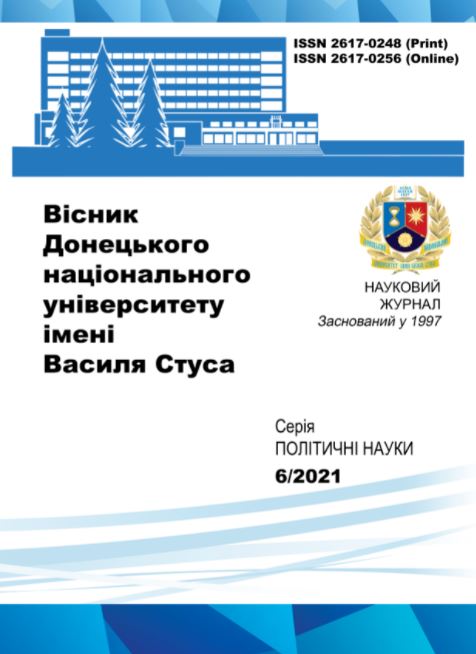The politics of knowledge of political science communities: “classical” texts in Kharkiv, Simferopol, Lviv and Chisinau
DOI:
https://doi.org/10.31558/2617-0248.2021.6.6Keywords:
classical texts of political science; political and ideological identifications; regions of Ukraine; Moldova; history of political science; postcolonialismAbstract
The article is devoted to revealing the influence of ideological orientations of students of political science communities of Ukraine (Lviv, Kharkiv, Simferopol) and Moldova (Chisinau) on the political science’ classical texts. This work is part of a larger study that captures the state of Ukrainian political science during 2012–2013 and provides a better understanding of the political, social, ethnic, economic, gender and disciplinary views of students on the eve of the Revolution of Dignity. The empirical basis of this article is a survey of the students enrolled in three types of academic program (bachelor’s, specialist’s and master’s degrees) at four universities: Ivan Franko National University of Lviv, V. N. Karazin Kharkiv National University, V.I.Vernadsky Taurida National University and Moldova State University.
The answers of the respondents allowed revealing several tendencies. In particular, this refers to the low level of their acquaintance with modern (Western) political science works as well as the influence of the regional context and ideological preferences on scientific interests. It is also important that students have almost no interest in domestic texts and / or authors. The complete disregard of the national scientific and political traditions by students makes the postcolonial interpretation of Ukrainian and Moldavian political science relevant. This means that Ukrainian and Moldavian students from the very beginning get used to the fact that their own political life and ways of categorizing it are presented by ancient, foreign and postSoviet (mostly Russian) scientists, politicians and even writers. Despite the obvious geopolitical conflicts of interest it is they who tell / explain what a real political science, politics, political past and future, political regimes are.
The final part of the article concludes that Ukrainian and Moldovan political science at the student level can be described as the one searching for the subjectivity, acting as a self-proclaimed “colony” of the Western or Russian scientific metropole. This puts on the agenda the following: the need to become interesting to themselves and to make the relevant political sciences truly topical to their own societies, acting as the original knowledge makers rather than repeaters of other people’s experience.
References
Goodin R. The State of the Discipline, the Discipline of the State The Oxford Handbook of Political Science. / Goodin R. (Ed.), Oxford University Press, 2009. P. 1–57. DOI: 10.1093/oxfordhb/9780199604456.013.0001
Kruglashov A. Ukrainian Political Science: From Quantity to Quality. Political Science in Central and Eastern Europe. Diversity and Convergence. Rainer Eisfeld & Leslie Pal (eds.). Verlag Barbara Budrich, 2010, P. 291–304. DOI:10.2307/j.ctvhhhhgs.23
Masuoka N., Grofman B., Feld S. L. The Political Science 400: A 20-Year Update. PS: Political Science and Politics. 2007. P. 133–145. DOI: 10.1017/S1049096507070199
Ravecca P. The Politics of Political Science. Re-writing Latin American Experiences. New York: Routledge, 2019. 292 p.
Shevel O. Ukrainian Political Science and the Study of Ukraine within American Political Science: How Similar, How Different? Journal of Ukrainian Politics and Society. 2015. No.1 Р. 23–32.
Sigelman L. Top twenty commentarie. American Political Science Review. 2006. Vol. 100, № 4. P. 667–688.
Sommit A., Tanenhaus J. American Political Science. A Profile of a Discipline. New York: Prentice Hall, 1964. 173 p.
Sommit A., Tanenhaus J. The Development of American Political Science. New York: Irvington Publishers, 1982. 246 p.
Гудин Р. И., Клингеманн Х.-Д. Политическая наука как дисциплина. Политическая наука: новые направления. Москва: Вече, 1999. С. 29–69.
Дмитриев Т. Классика и история политической философии: случай Лео Штрауса. Классика и классики в социальном и гуманитарном знании. Москва: Новое литературное обозрение, 2009. С. 155–180.
Капелюшников Р. Деконструируя «классика» (заметки на полях «Великой трансформации»). Классика и классики в социальном и гуманитарном знани. Москва: Новое литературное обозрение, 2009. С. 121–154.
Кармазіна М. Історія дисципліни / редкол.: чл.-кор. НАН України О. Рафальський (голова), д-р політ. наук М. Кармазіна, д-р іст. наук О. Майборода : Політична наука в Україні. 1991-2016 : у 2 т. Т. 1. Політична наука: західні тренди розвитку й українська специфіка / автор передм. О. Рафальський : відп. ред. і упоряд. М. Кармазіна. Київ : Парламентське видавництво, 2016. С.17-44.
Классика и классики в социальном и гуманитарном знании. Москва: Новое литературное обозрение, 2009. 536 с.
Куделя С. Чи можлива в Україні політична наука? Критика, 2012. № 1–2. С. 24–25.
Мацієвський Ю. Чому в нас немає політичної науки. Критика, 2012. №6. С. 10–12.
Муляр В. I., Венгерська В. O., Сухачов С. Я. Аналiз навчальної літератури з політичної науки, виданої в Центральном і Західном регіонах України. Политическая наука в Украине: становление и перспективы. Симферополь, 2002. С. 97–143.
Николко М. В. Институционализация политической науки в Украине: анализ периодических изданий. Политическая наука в Украине: становление и перспективы. Симферополь, 2002. С. 40–52.
Осин В., Зеленски А., Шуляк С. Власть и знание на постсоветском пространстве: политический режим, научная степень, идеология и карьера в Украине и Молдове. Вильнюс, 2014. 376 с.
Осин В. Наука в новом мире: Три сюжета генезиса региональной политологии в постсоветской Украине. Ab Imperio. Studies of New Imperial History and Nationalism in the Post-Soviet Space, 2015. №. 4. С. 239–293.
Политическая наука в Украине: становление и перспективы. Симферополь, 2002. 344 с.
Раздина Е. В. Анализ учебной литературы по политической науке, используемой в вузах восточного региона Украины. Политическая наука в Украине: становление и перспективы. Симферополь, 2002. С. 72-96.
Савельева И., Полетаев А. Классическое наследие. Москва: ГУ–ВШЭ, 2010. 336 с
Старіш О. Політична наука в Україні: 20 років незалежности. Критика, 2012. № 9-10. С. 27–29.
Филатов А. С. Анализ учебной литературы по политической науке, используемой в ВУЗах Украины. Политическая наука в Украине: становление и перспективы. Симферополь, 2002. С. 144–186.
Эткинд А. Внутренняя колонизация. Имперский опыт России. Москва: Новое литературное обозрение, 2014. 448с.

